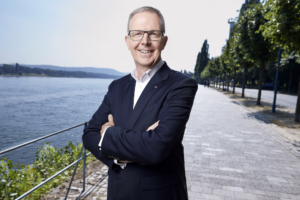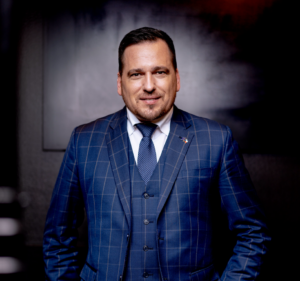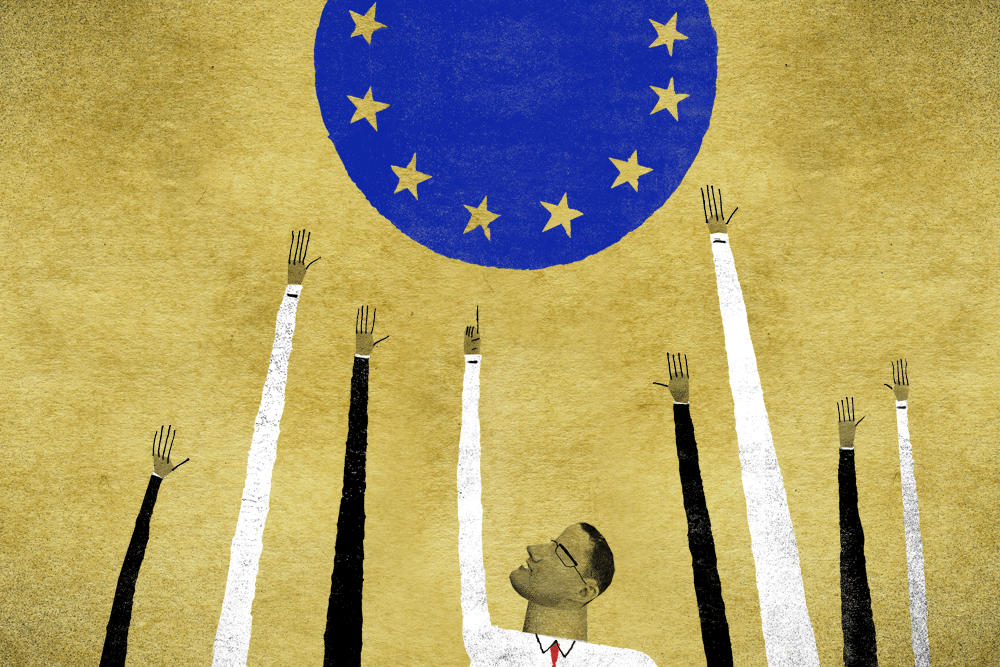From June 6 to 9, voters will elect 720 members to the European Parliament, for a five-year term ending in 2029.
Three long-time legislators interviewed for this article may or may not win re-election. But they represent a diverse sample of the candidates and their concerns. Pieter de Gooijer, Partner in Brunswick’s Brussels office, sat down with the three incumbents to ask about the term just ended and the challenges ahead.
German lawyer and MEP Axel Voss, from the center-right European People’s Party (EPP), has served in parliament since 2009. Dutch liberal Sophie in ‘t Veld has been a MEP since 2004 and serves on the European Parliament’s Committee on Civil Liberties, Justice and Home affairs. Czech Tomáš Zdechovský is a businessman and entrepreneur in communications who has been an MEP since 2014.
Axel Voss

Voss, a member of the German center-right, is somewhat disappointed with the rate of progress in matters related to digital legislation. He says, “My expectation regarding digital development has surpassed what we have achieved. We’ve certainly made progress in the right direction with regulations like the Digital Services Act, Digital Markets Act and others. However, I believe that it’s not quite sufficient.” He pushes for a more comprehensive strategy in addressing digital issues beyond regulatory measures.
MEP Voss is no stranger to the EU’s digital rulebook, having been the European Parliament’s draftsperson on a number of key reports in recent years, such as the General Data Protection Regulation (GDPR), AI Act and Copyright Directive.
On digital competition, Voss emphasizes, “Regulation alone won’t suffice in the digital competition landscape. Take the AI Act, for example. We need to navigate the conflict between generative AI and individual rights, copyrights and fundamental rights. Finding a pragmatic approach is crucial.” For Voss, clear guidelines and interpretations are critical in order to avoid legal uncertainties.
Voss calls for greater political strength and argumentation. He believes that decisive action is needed to break through barriers such as bureaucracy and reluctance to give up national control, fostering European cooperation.
He advocates for greater investment in technology and, like Zdechovský, alliances with democratic nations to strengthen Europe’s position in the global landscape.
Sophie in ‘t Veld

Reflecting on the past five years, in ‘t Veld, a Dutch liberal, sees progress and challenges. While strides have been made in policy coordination during crises like the COVID-19 pandemic, according to in ‘t Veld, concerns persist about what she calls a decline in democratic functioning within the EU. She sees a lack of transparency in decision-making processes around pressing issues.
In ‘t Veld believes institutional changes are needed to restore the balance of power and ensure greater accountability.
“The EU faces the challenge of being perceived as solely an economic entity rather than a political one,” she says. “This misconception undermines the importance of democratic principles within the EU’s decision-making processes. As the EU ventures into areas where democracy and accountability are crucial, such as providing military aid to Ukraine, there’s a pressing need for enhanced political accountability.”
She advocates for the European Parliament to play a stronger role in shaping EU policies and decisions and underscores the need for greater parliamentary scrutiny and oversight to revitalize European democracy. “The European Parliament needs to put its foot down, demand its own resources, and use all the powers it has,” she says.
In ‘t Veld sees reason for optimism in the emergence of a new generation of leaders, particularly from Central and Eastern Europe. Despite a lot of hand wringing about conditions in the EU, she says, “In the past 70 years, it is pretty amazing what we have achieved.”
Bias against women in politics persists, she says. “The biggest problem that I’ve encountered is that subconsciously, people judge women in a different way,” in ‘t Veld says.
Tomáš Zdechovský

A Czech center-right MEP, he sees the need for a renewed focus on security, particularly in light of Russia’s invasion of Ukraine. He calls for increased funding for defense, stressing that without security, Europe cannot maintain a stable market or agricultural sector. “Security is problem number one,” Zdechovský states, advocating for greater investment in defense.
Zdechovský also emphasizes the need for fair competition and mutual respect in international relations, saying, “The US is our number one partner. However, finding a balance is crucial. Europe tends to be overly regulated, while the USA sometimes operates with too much freedom. Achieving equilibrium between our positions is essential.”
In terms of competitiveness, Zdechovský promotes a more assertive industrial policy, emphasizing the importance of supporting European industry and fostering open dialogue. He raises concerns about unfair trade practices and calls for measures to protect European markets from undue competition. Zdechovský asserts, “If we aim for fair competition, we must safeguard our market.”
For Zdechovský, this goes hand-in-hand with environmental policies. He urges a balanced environmental policy, underlining a need for more studies and analysis to ensure that policies are based on facts rather than ideological considerations. This position may be tied to the fact that the EPP, the political party the MEP belongs to, recently stated its stance on the Green Deal in its manifesto, calling on EU leaders to focus on Europe’s re-industrialization instead.
“Economic prosperity, balanced environmental protection and social peace can only succeed in Europe if our economy is also successful worldwide,” he says. “This is why competitiveness is so crucial.”

